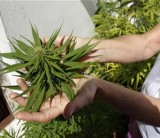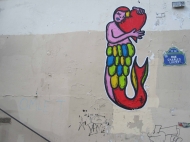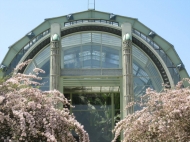Seen from Paris, blog about Paris
You thought Parisians are witty, arrogant, bitching about everything and anything, obsessed with food and culture, and always up for discussion? Well... you're perfectly right! And you're on the right page to check it out.

New hopes for the end of a costly war on drugs
After Colorado, Uruguay just legalized Cannabis and the state will organize its trade. Are we finally reaching the age of wisdom on drugs?
We all have the advertising campaigns, the official messages stuck in our head, on how drugs, all drugs are equally dreadful for us. We know most countries on the planet are waging a substantial war on drugs. And we know it’s not working. The path chosen, the path of Prohibition, has been failing. As it always has.
But how much more of blood, money waste and incredible disrespect of logic can we take? I am writing from a country where one third of the population under the age of 64 admits to have smoked pot. We’re talking millions of people. And that’s of course without all of them people who are not admitting it, who “smoked but didn’t inhale”… Today, more and more people fail to understand the rational behind the war of drugs.
First, making criminals out of drug users is philosophically not acceptable. It might be useful for judging people, to throw them in jail, but the line behind it is wrong. At the best, they are simply enjoying drugs, at the worse, they got stuck in addiction, which makes them addicts, but not criminals. And that can only be with some very specific drugs.
Because, and second, gathering all drugs in one only concept, “drugs”, is also preposterous, as drugs vary in effect and in toxicity. And when you look down on what science says for each product, you might be surprised, as it is often not the devilish chemical monster you thought is was… Because treating altogether items that don’t have anything in common doesn’t make any sense, we will only address here cannabis, which is by far the most used drug in France (after alcohol and tobacco, of course).
The ban on cannabis has brought nothing good to this country, or to the world. It teaches people not to trust the state and its laws: after all, when you’ve been smoking pot for so long and your life is just perfect, what is all the fuss about? People just realize that the laws do not fit with reality. In the same way, they see how science is kidnapped by politicians. It is impossible to find a good scientific reason to ban cannabis. Just go ahead, and look for one. Browse the internet. Ask the Academy. They will come back to you with people driving, with people dropping out of class or being depressed, or getting cancer, but the link showing cannabis consumption as a cause is never clearly established, except for the first point (smoking and driving) which is more of a matter of education (just like with alcohol, you shouldn’t smoke and drive). But nobody ODed on cannabis. It is simply not possible. And if the excess of its consumption is definitely bad for you, most people have a very wise use of it.
The ban however exonerates the state from protecting the user. Most of the issue with drugs comes from the fact that the quality of it is not being controlled, and sometimes people end up with poison, litterally, rather than the product they want. In that sense, the ban on drugs, and more precisely cannabis, is increasing public health issues.
The cost of the ban is absolutely amazing. Between the billions spent in justice (in 1999, 85% of all drugs arrests in France were related to cannabis (CF rapport annuel de l’UE sur l’état du phénomène de la drogue). Prisons are pacted with drug dealers and users, to the point that there is not enough room anymore) and the money lost by not organizing the sale, we are probably losing several GDP points in a time of crisis where they would be most needed! If we were to cut off the expenses and collect the taxes on that product, and creating the official jobs of selling it, it would be a major contributor to our economy. For the record, Cannabis sales bring in several billions euro to the Dutch economy where it is tolerated. And for the decades it has been tolerated there, no significant increase of cannabis consumption has been seen…
But the cost of the ban is mostly paid in blood. As the governements don’t want to face reality and keep on fighting against the fake image of a plague, they give all the room they want to mafia gangs to do the job of growing and selling the merchandise. It would be useless to detail the headlines, everybody knows what happens in Mexico or in the North area of Marseilles, but let’s not be mistaken: the money we don’t make officially by organizing the trade of drugs is the money that fuels mafia activities worldwide. And that cannot be tolerated any longer…
For all these reasons, a few days ago, in a very brave move, Uruguay has taken the decision to legalize cannabis, and to run its trade from the field to the user. Just like in the Netherlands, there is no reason that suddenly all Uruguyans will end up smoking crack in the streets of Montevideo, but this little country is doing itself a huge intellectual and financial favor with this law.
Hopefully, it will be the beginning of a larger trend, at the end of which the counter-productive prohibition we are experiencing in the world will be replaced by, simply, a better education. Because it makes more sense to inform people on how to best use things and not take any risks than to deprive them of their natural right to do what they want as long as they are not hurting others. This philosophy was set in the 18th century by the philosophers we based our democracy on, and France, and the world, would be well inspired to rediscover it in the near future, for both our peace and our economy…





